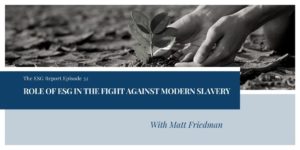
People often ask, ‘Which companies are bad and shouldn’t be bought from?’ In reality, there is no way of determining that, across the board. Some companies getting called out doesn’t mean that others aren’t having issues. “ESG has that potential to introduce the baseline we’re all looking for,” says Matt Friedman, and in this episode, he and host Tom Fox discuss ESG’s role in the fight against modern slavery.
What is Modern Slavery?
Modern slavery is defined as a situation where a person is tricked and deceived into a job situation where they can’t get out, and don’t get paid. Matt reveals that it often happens to migrants who are taken from one place to another, and that there are about 40 million people estimated to be in modern slavery around the world, “There are more slaves today than any other time in history.”
While sex trafficking is a large component of modern slavery, it’s actually a much broader issue. Many Latin Americans who manage to get into the US are highly exploited; they’re picking our tomatoes and oranges, and they don’t get paid at all because they’re indebted, and domestic cleaners are in situations where they’re locked in the house, not able to do anything to protect themselves or escape.
The Work of The Mekong Club
The Mekong Club is a non-government organization set up in Hong Kong to work with the private sector in a positive and supportive way, and to help them understand the issue of human trafficking and what needs to be done to address it. Matt says, “Our role is to work with them, not against them.” With some organizations, the only way to get the private sector to take action is to find something they’re doing and embarrass them enough for them to implement change. The Mekong Club isn’t that kind of organization. Instead, they try to offer the services and consultations needed by the company in order to protect themselves.
About 32 tools are available, offering remedies that come from private sector companies, themselves. One of the first things done with companies is a self-assessment; based on the results, Mekong Club rates the extent to which they are achieving what needs to be done in terms of modern slavery, and works with them in order to mitigate the problems. “This is what they say they need, and whatever it is that they need, they get.” he tells Tom.
The ‘S’ in ESG
In Matt’s opinion, the ‘S’ in ESG has always been the orphan. Since it includes human rights, modern slavery, and safety, it is viewed by many as not having measurable, potential risk. As a result of this, a lot of modern slavery indicators – what Matt calls ‘superficial S indicators’ – aren’t up to par with other areas of ESG. Matt and The Mekong Club strive to change that, “We have to have companies actually demonstrate they’re actually doing something when they say they’re doing it.”
The Road to a Robust Company
The Mekong Club focuses on various things when it comes to improving a company – many of which are easy, cost-efficient, and can be implemented by you now, in your own companies. Some of these include:
- Making the leaders understand that modern slavery is a relevant and important issue.
- Having a point person or team of individuals within the organization that are ‘focal people.’ They would be better trained and receive whatever tools/instructions.
- Issuing policies and procedures: e.g. Do you have a zero tolerance statement? Do you have a mechanism in place to ensure that workers’ voices are heard? If you find forced labor, how do you remediate it?
- Developing tools.
RESOURCES
Matt Friedman | Where Were You?: A Profile of Modern Slavery
The Mekong Club | The Mekong Club paper | PDF summary of our tools | Here is our most recent membership brochure | The mini-assessment tool


